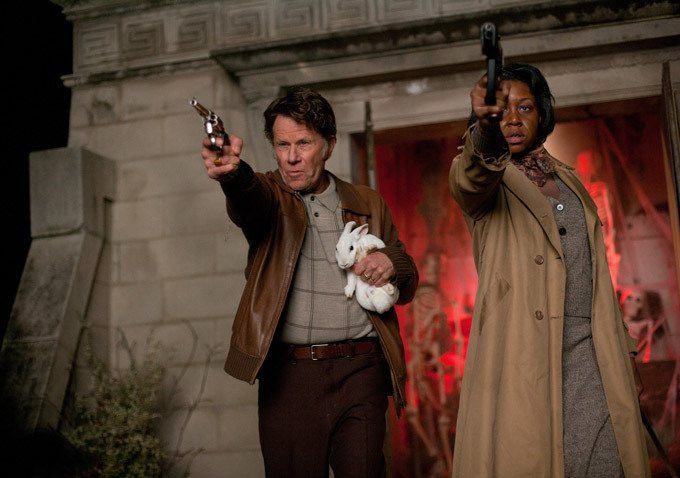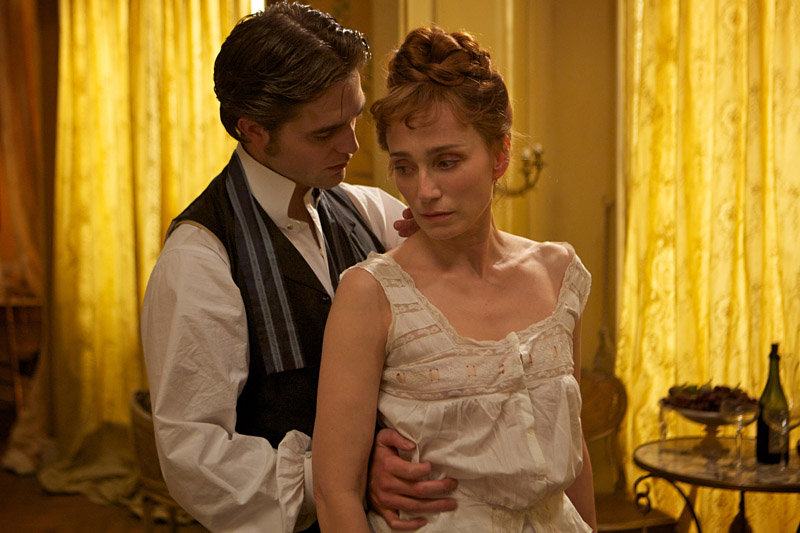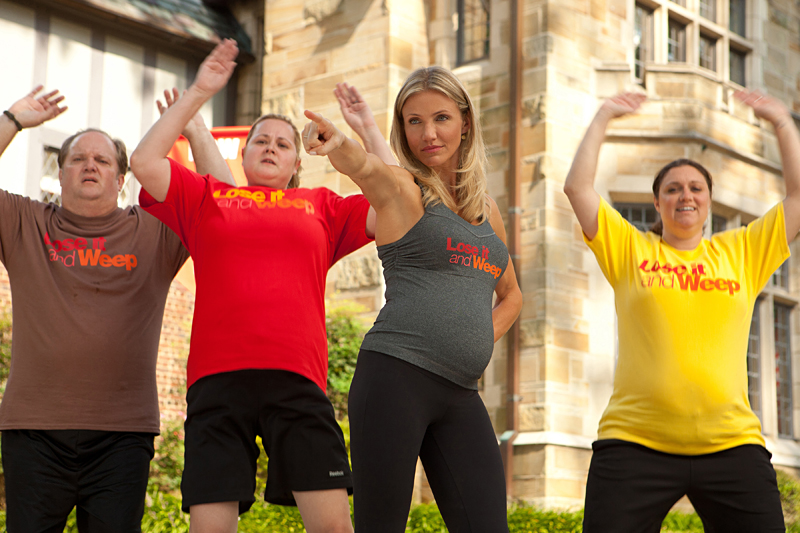In Martin McDonagh’s Seven Psychopaths, a prune-faced, simian-mouthed sexagenarian sits by the road in an old suit and brown-patterned tie, and cradles a white bunny in his arms. This is precisely what we’ve come to expect of a Tom Waits entrance. Waits has long been one of Hollywood’s favorite sight gags: a hot blast of ciggy-smoke hep-cat cool to remind us of the crazy carnival of life, Amen.
“I do some acting,” he told Pitchfork in 2006. “And there’s a difference between ‘I do some acting’ and ‘I’m an actor.’” Yet after 34 years of cameos, edge-of-frame color, and raspy voice work (along with the odd headlining gig), such talk sounds insincere. Fact is, Waits has been a character actor for almost as long as he has been a recording artist, and he has refined and mastered his roles. Behold the Waitsian range, in six typologies.
Musicians In the beginning, Waits was largely typecast as musicians like himself in films like Sly Stallone’s Paradise Alley (as the all-too-accurately named Mumbles) and One From the Heart (for which his score received an Oscar nomination). But soon, he was tabbed for music-related roles like nightclub MC Irving Stark in The Cotton Club, and radio DJs in Jim Jarmusch’s Night on Earth and Down by Law. The latter still stands as one of Waits’ finer achievements, a chance to marshal his Cookie Monster growl and Quasimodo posture for character, not just quirk. His Zack wears wounded masculine pride like an inside-out shirt—exposed but still armored. Defiantly blasé about his soon-to-be ex (Ellen Barkin) flinging his collection of 45s out the window, he finally draws the line at his beloved alligator-skin boots. “Not the shoes,” he says, right before following them out to the gutter. Accessories and affects: cigarette, cocked hat, no eye contact, soul patch.
Bartenders When Waits didn’t play a musician in the early days, he was penned behind a bar, most notably in Francis Ford Coppola’s S.E. Hinton adaptations, The Outsiders and Rumble Fish. The stylized, far superior latter film gave him a chance to try out what would become his cinematic signature: talking to himself. “Time is a very peculiar item,” he says to an empty room. “When you’re a kid, you got nothing but time. The older you get, you say, ‘Jesus, how much I got?’ I got 35 summers left. Think about it—35 summers.” Accessories and affects: cigarette, cravat, dishrag, soul patch.
Professional Drunks Most of Waits’ characters could be considered lushes, but it’s as the committed, whiskey-for-breakfast alcoholics at which he has really excelled, from his heartbreaking—and exactingly disheveled—turn as Rudy in Ironweed (“I don’t need me no stone,” he says to Jack Nicholson at a graveyard. “Just so’s I don’t have to die alone”) to his improbably endearing Earl in Robert Altman’s Short Cuts. Although he’s a self-pitying, shit-faced good-for-nothing who doesn’t deserve the love of his woman (Lily Tomlin), Waits gives Earl enough goofily amorous charm to make him worth forgiving, thanks in large part to a naturally rangy expressiveness of voice reminiscent of his growl-to-falsetto singing arsenal. Of that film’s embittered, disloyal, and vindictive men, it’s the soused and sentimental Earl with whom we want to ride out an earthquake. Accessories and affects: flask, well-worn suit, unkempt carrot-top curls, seemingly independently motivated sobs and giggles.
Eccentrics This might seem like a catchall, but Waits plays eccentricity not as an attribute but as a guiding spirit, motivating such disparate parts as a dead man searching for his dog in the afterlife (Wristcutters: A Love Story); a shifty, gum-chewing bachelor with an unconvincing outer-borough accent (Queens Logic); a twitchy tinkerer scientist who specializes in “non-lethal” weaponry (Mystery Men); and a barking-mad, bug-munching, vampire acolyte (Bram Stoker’s Dracula). But it’s in the long-forgotten crime farce Cold Feet that Waits’ weirdo jive strives most ambitiously for eccentric genius. Opposite Keith Carradine and Sally Kirkland (I heart 1989), Waits plays a bronzed, coiffed, driving-glove-wearing wacko named Kenny who performs sit-ups out of the window of a moving car, writes postcards to Mommy in between felonious schemes, and proffers Turkish figs to friend and foe alike. Waits is cacophonous, unintelligible, and fully committed to his spectacularly terrible performance; this may well be the moment the hobbyist became a professional. Accessories and affects: sculptural head hair, eagerly deployed chest hair, soul patch, pince-nez.
Seers Waits has less than two minutes of screen time in The Fisher King, but his wheelchair-bound veteran effectively douses Terry Gilliam’s fantasy in bracing truth-talk. “I’m what you call kind of a moral traffic light,” he says with the wisdom of a man settled at rock bottom. Thanks to his chain-saw-chummed speaking voice, Waits is often asked to orate strange wisdom on-screen, from his bored, Beelzebubian immortal Mr. Nick in The Imaginarium of Doctor Parnassus to his dropped-from-the-sky plot contrivance of a prophet in Tony Scott’s Domino. Even before he appears in the desert, Waits’ soothsayer is preceded by a Waits music cue (Bone Machine’s “Jesus Gonna Be Here”) that yanks away any pretense from his appearance—he’s just there to be Tom Waits, harbinger of cool. Accessories and affects: hat, cane, monotone, eye contact, soul patch.
Tom Waits An amalgam of all of the above, Waits’ best role has always been that of Tom Waits. Sift through his ’70s chat-show appearances and watch the shtick take shape: He’s an impish riddle eager both to confound and please. Far from a cynical put-on, Waits has proved an amenable, durable construct, never more amusing than when turned back on itself (as in Coffee and Cigarettes). It’s doubtful that Waits will ever top his pseudo-candid performance on Fishing With John, the short-lived fishing-expedition show dreamed up by fellow Jarmusch alum John Lurie. Rather than pawning off his persona to Hollywood, here he’s making his own mischief—shoving fish down his pants for easy laughs and improvising songs that are sorta brilliant, totally dumb, and unmistakably Waits. Accessories and affects: cool, clowning, all of the above.








